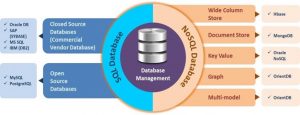

In the current era dominated by data, businesses heavily depend on databases to efficiently store, manage, and analyse their information. However, managing databases in-house can be complex and resource-intensive. That’s where database service providers come in, offering services that allow businesses to outsource their database management needs. But with numerous options available, how do you select the right service provider? Here are some key factors to consider when evaluating a database service provider:

Reliability and Performance
Downtime can have severe consequences on your business, leading to loss of revenue, productivity, and customer trust. Therefore, it’s essential to choose a database service provider that guarantees high reliability and availability. Look for providers that offer strong data replication, failover mechanisms, and built-in severance to minimize the risk of downtime and ensure uninterrupted access to your data.

Scalability
As your business grows, so does your data. It’s essential to choose a provider that can scale with your needs. Whether you anticipate a gradual increase in data volume or sudden spikes in demand, your database service provider should be able to accommodate these changes seamlessly. Scalability ensures that your database infrastructure remains responsive and efficient regardless of fluctuations in workload.
Security
Data security is top concern, especially when entrusting your sensitive information to a third-party provider. Evaluate the security measures implemented by the provider to safeguard your data against unauthorized access, breaches, and cyber threats. Look for features such as encryption, access controls, and regular security audits to ensure compliance with industry standards and regulations.

Data Integration and Compatibility
Your database service provider should offer unified integration with your existing systems and applications. Compatibility issues can hinder productivity and lead to data inconsistencies. Ensure that the provider supports the database platforms and technologies you currently use, and inquire about their capabilities for integrating with third-party tools and services.
Global Reach and Data Localization
If your business operates on a global scale or has customers in different regions, consider the geographic reach and data localization capabilities of the database service provider. opt for providers with a global network of data centers or cloud regions, allowing you to store and process data closer to your users while complying with local data residency requirements. Moreover, ensure that the provider offers vigorous data replication and synchronization capabilities to maintain data consistency and availability across multiple regions.

Flexibility and Customization
When it comes to database management, every business has exclusive requirements. A good provider should offer flexibility and customization options to tailor their services to your specific needs. Whether it’s configuring database settings, implementing custom workflows, or integrating with proprietary applications, the provider should be willing to work with you to meet your requirements.
Data Backup and Recovery
Data loss can occur due to various factors such as hardware failures, software glitches, or human errors. Therefore, it’s essential to choose a database service provider that offers ultimate backup and recovery solutions. Look for features such as automated backups, point-in-time recovery, and geo-redundant storage to ensure that your data is protected and can be quickly restored in the event of a disaster.

Performance Monitoring and Optimization Tools
Databases require ongoing maintenance and support to ensure optimal performance and reliability. Beyond initial setup, ongoing performance monitoring and optimization are crucial. Your selected provider should offer strong monitoring tools and analytics dashboards to track key performance metrics such as CPU utilization, memory usage, disk I/O, and query execution times. These tools can help you identify performance bottlenecks, optimize resource utilization, and proactively address potential issues before they impact your operations. Also, consider whether the provider offers automated performance tuning features or recommendations based on machine learning procedures to continuously improve the performance of your database workload.

Cost and Pricing Structure
Cost is a noteworthy aspect in any decision of business. Evaluate the pricing structure of the service provider to ensure it aligns with your budget and provides value for money. Consider factors such as subscription fees, usage-based pricing, and any additional costs for storage, bandwidth, or support services. Beware of hidden fees and long-term contracts that may lock you into unfavourable terms.
Data Governance and Compliance
As data privacy regulations become more stringent worldwide, ensuring compliance with regulatory requirements is paramount. Choose a service provider that prioritizes data governance and compliance, offering features such as data masking, anonymization, and audit trails to help you meet regulatory obligations. It is recommended to consider whether the provider offers built-in compliance certifications or assists you in achieving and maintaining compliance with relevant standards and regulations.
Innovation and Future-Proofing
Technology is continually developing, and your database requirements may evolve accordingly. An efficient database service provider emphasizes innovation and invests in research and development to stay ahead of emerging trends and technologies. The providers should offer regular updates, new features, and integration with innovative technologies such as artificial intelligence, machine learning, and blockchain.
Reputation and Customer Feedback
Finally, do your research and assess the reputation of the provider in the industry. Look for reviews, testimonials, and case studies from existing customers to measure their satisfaction level and experiences. A provider with a proven track record of delivering quality services and excellent customer support is more likely to meet your expectations.
To Conclude
Selecting the ideal database service provider is essential for optimizing data management processes and ensuring the integrity and security of your information assets. BriskWinIT Solutions stands out as a premier option in this landscape, offering a comprehensive suite of services tailored to meet the diverse needs of businesses. With a proven track record of reliability, scalability, and security, BriskWinIT Solutions provides peace of mind to clients, allowing them to focus on their core operations while entrusting their database management needs to a trusted partner.
As per techneplus.com,

Frequently Asked Questions
With the innumerable of options available in the market, exploring the circumstances of database service providers can be a daunting task. To help you make informed decisions and address common queries, we’ve compiled a list of frequently asked questions (FAQs) about choosing the right database service provider. Let’s have a look,
What factors should I consider when choosing a database service provider?
When selecting a database service provider, it’s essential to consider factors such as scalability, performance, reliability, security, flexibility, integration capabilities, cost-effectiveness, support, and reputation. Evaluating these factors can help you choose a provider that aligns with your business goals and requirements effectively.
How can I ensure the scalability of the database solutions offered by a provider?
To ensure scalability, look for providers that offer flexible solutions capable of accommodating your growing data needs. Consider factors such as the provider’s ability to handle increased workloads, support for auto-scaling, and seamless migration paths to more healthy solutions as your business expands.
What measures should a database service provider have in place to ensure data security?
Data security is top when selecting a database service provider. Look for providers that offer enough security features such as encryption, access controls, authentication mechanisms, auditing capabilities, and compliance with industry standards and regulations.
How can I assess the performance of the database solutions offered by a provider?
Assessing the performance of database solutions involves evaluating factors such as query processing speeds, data retrieval times, throughput, latency, and overall system responsiveness. Conducting performance testing and benchmarking can help you measure the performance of a provider’s solutions under real-world conditions.
What level of support can I expect from a database service provider?
The level of support provided by a database service provider can vary depending on factors such as the provider’s service level agreements (SLAs), support availability, response times, resolution times, and escalation procedures. Choose a provider that offers responsive customer support and comprehensive SLAs to ensure timely assistance when needed.
How does data backup and recovery work with database service providers?
Database service providers naturally offer data backup and recovery solutions to protect against data loss. Look for providers that offer features such as automated backups, point-in-time recovery, and geo-redundant storage to ensure that your data is backed up regularly and can be quickly restored in the event of a disaster.
Are there any industry-specific compliance requirements I need to consider when choosing a provider?
Depending on your industry and geographic location, you may be subject to specific compliance requirements such as GDPR, HIPAA, or SOC 2. opt for a database service provider that understands and complies with these regulations, offering features and certifications that support your compliance efforts.
Can I integrate the database solutions offered by a provider with my existing systems and applications?
Unified integration with existing systems and applications is essential for maximizing productivity and efficiency. Look for providers that offer comprehensive integration options, including APIs, SDKs, connectors, and compatibility with popular programming languages and frameworks.
How do I ensure business continuity and disaster recovery with a database service provider?
Business continuity and disaster recovery are critical considerations when choosing a database service provider. Look for providers that offer vigorous disaster recovery solutions, including data replication, automatic failover mechanisms, and recovery point objectives (RPOs) and recovery time objectives (RTOs) tailored to your business needs.
Contact Us
To further explore the intricate world of database services and discover how they can revolutionize your business operations, we invite you to dig into this comprehensive guide. Whether you are a startup seeking professional guidance or a large enterprise aiming for enhanced performance and security, this guide equips you with the essential insights to make an informed decision.
And when you’re ready to connect the power of pioneering database technology, consider opting for the services of BriskWinIT Solutions. From unified scalability to robust security features, we offer a comprehensive suite of services designed to propel your business forward.
Don’t settle for unevenness when it comes to your database infrastructure. Choose BriskWinIT Solutions and expose the full potential of your data-driven initiatives. Contact us today to learn more about our services and embark on a transformative journey towards success. So, please log into https://briskwinit.com/database-services/.
Thanks for your valuable contribution!